Ben-Hur (2010)
It is difficult to compete with the big-screen blockbuster that has become a classic, but that is precisely what this British-Canadian miniseries attempts to do -- approach a famous story from a new and exciting modern perspective. In many ways it succeeds, and in others it fails.
As children, Judah Ben Hur and Messala are the best of friends, spending their time pretending to chariot race with the work horses and shooing Judah's younger sister Tizrah away from them. Then the fateful day comes when Mesalla's important father in Rome sends for him, and the illegitimate son must leave his adopted family behind. Many years later, Judah (Joseph Morgan) has grown into a man and at the bidding of his mother Ruth (Alex Kingston), agrees to become engaged to the beautiful Esther (Emily VanCamp). Their slow fondness for one another is beginning to bud when news arrives that Messala (Stephen Campbell Moore) has returned and requested an audience. He is not the man Judah remembers... cold and ambitious, with a mind more inclined toward the lax morality and power-hungry ideals of Rome, he has been assigned to protect the arrival of Pontius Pilate (Hugh Bonneville) to Jerusalem. There are concerns of an impending uprising and a plot against the new governor's life.
His demand that Judah inform him if he hears of any such plots of insurgency upset Tizrah (Kristen Kreuk) and threaten to drive a wedge between them. And when a horrific accident nearly ends the life of Pilate as he enters Jerusalem, the lives of the Ben Hur family will never be the same -- leading Judah on a journey of self-discovery, vengeance, and redemption that in some ways is glorious and in others woefully lacks the religious drive of the original. I have incredibly mixed feelings about this miniseries because in many ways it is glorious and vastly improves on the better-known film -- it has much better dialogue, far better characterization, and makes better use of its time. The character development is improved, lesser figures are fleshed out more, and there is an even more apparent sense of urgency beneath it, as Judah desperately tries to avenge his family. The costume design is luxurious and it really makes you feel as if you are walking the streets of Rome or peering through windows in Jerusalem. We also get a much more empathetic and tragic view of Messala.
Unfortunately, along with these improvements come a hearty dose of content that make it inappropriate for family viewing -- and the gradual realization that Christianity has been stripped as much as possible from the story, so watered down that it leaves the inevitable conclusion feeling somewhat pale. There is no mention of Judah's mother or sister having heard of Jesus or desiring to ask for Him to heal them, and although Esther is a follower, she never mentions Him or His influence in her life. Judah has two encounters with Christ and both are important, but not to such an extent that if you were unaware of the storyline you would comprehend how much this changes him.
The cast is quite good particularly in the lesser roles where a number of talented actors find their footing as Romans. Though they play Pilate as a bit of an oaf at the start I liked him at the end. I also enjoyed seeing Kristen Kreuk in a more serious role, but she and Alex Kingston are under-used. There are some beautiful scenes and patches of dialogue that express the story quite well, including the great battle at sea, but I also feel compelled to mention that the film takes historical liberties and is never completely accurate in its depiction of Jewish rituals and laws. (Lepers are seen wandering the streets, interacting with people!) I wish they had left out the problematic elements and added a bit more of the salvation aspect of the original novel, because from a a non-biased viewpoint, this would have become the definitive version for me.
Sexual Content:
There is one explicit, lengthy sex scene with movement and nudity; we later see a woman's breasts again as she tries to entice him into bed. Backside nudity is shown; conversation revolves around a whore.
Language:
None.
Violence:
Many fighting scenes but most of the gore is kept off-camera; chariots turn over and dump out their occupants -- the most gruesome part is when a man is run over by six horses and a chariot, his body left bleeding and battered in the road. Others are stabbed or drown; a man has cut his wrists and bleeds to death in a pool of water; another vomits up blood after having been fed ground glass.
Other:
A character prays to his pagan gods.

